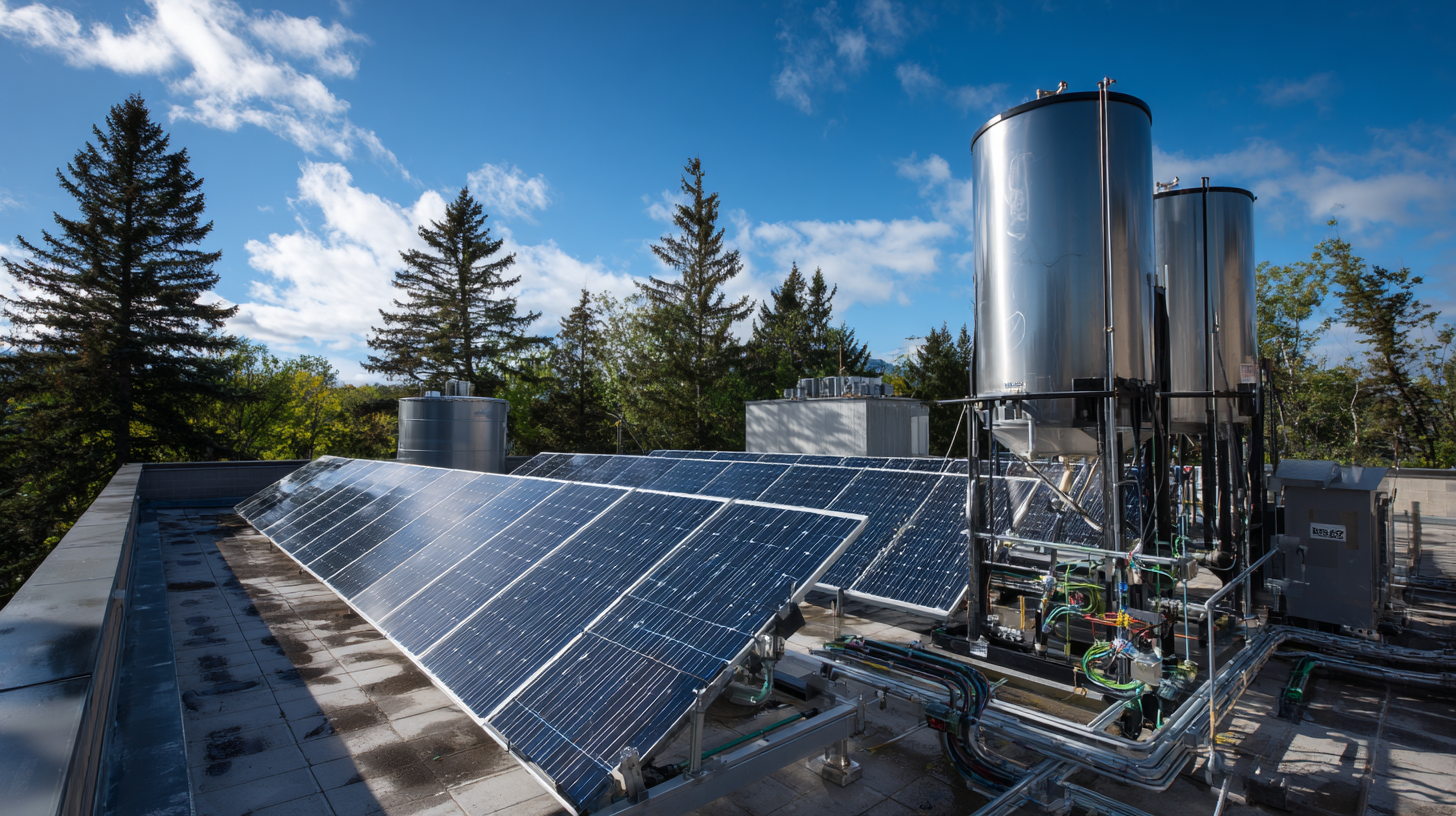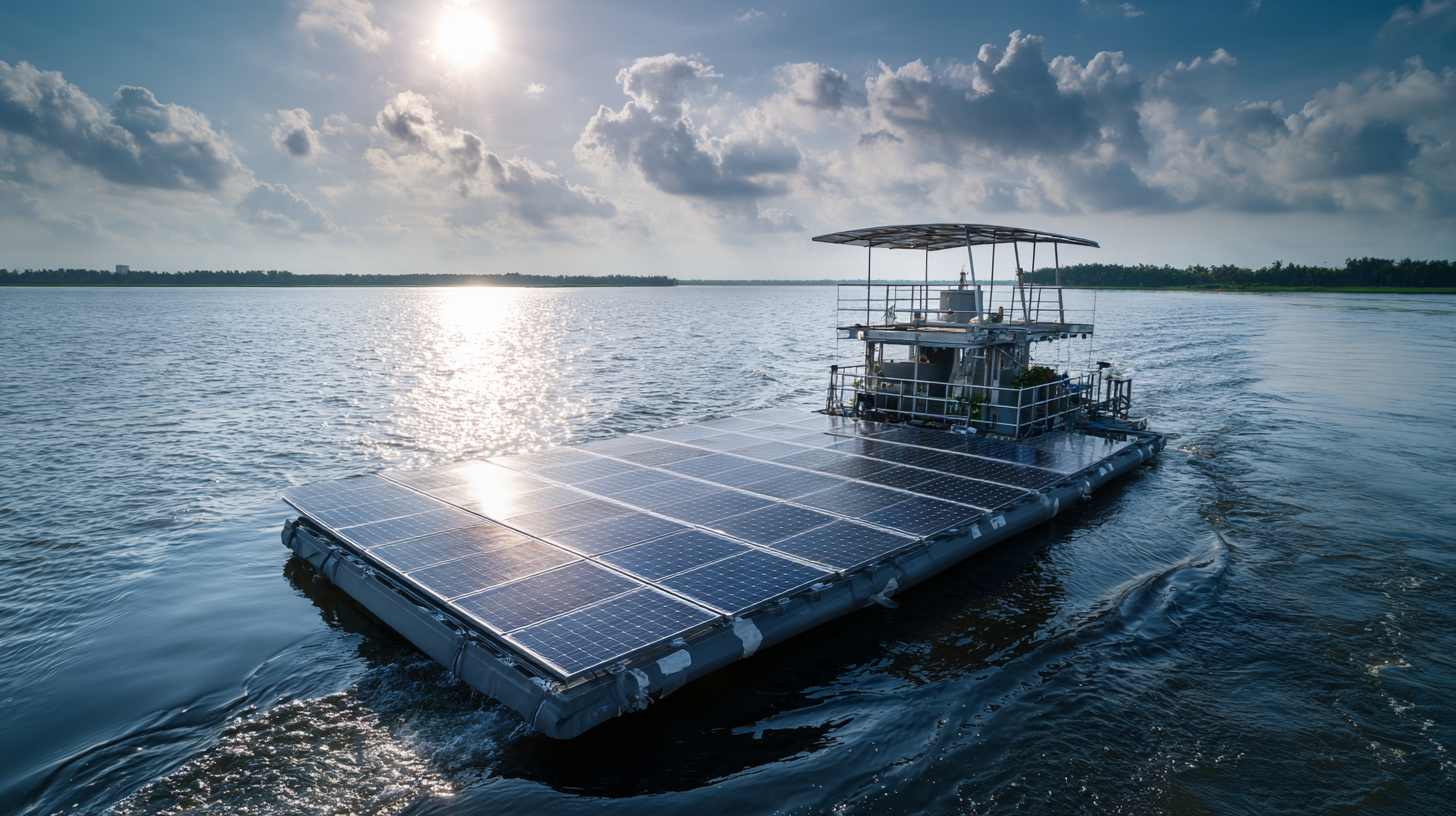Tel : 94870 36000, 94860 36000, 94890 36000
5 Reasons Why the Best Water Solar System is the Future of Sustainable Energy
In recent years, the demand for sustainable energy solutions has surged, with a reported increase of over 20% in renewable energy installations globally, according to the International Renewable Energy Agency (IRENA). Among these, the Water Solar System stands out as a particularly promising innovation. This hybrid approach not only harnesses solar energy for power generation but also provides an efficient water heating solution, thereby significantly reducing carbon emissions. A report by Grand View Research predicts that the global solar water heating market will reach $4.5 billion by 2025, presenting a compelling case for its expanded adoption. With increasingly stringent regulations on carbon footprints and the rising cost of traditional energy sources, investing in a Water Solar System is not just beneficial but vital for businesses aiming to lead in sustainability. As we delve into this topic, we will explore five compelling reasons why the Water Solar System is heralded as the future of sustainable energy solutions.

Table of Contents
[Hide]
Reasons Why Water Solar Systems Will Dominate the Renewable Energy Market by 2025
As we approach 2025, the renewable energy market is on the brink of a significant transformation, with water solar systems emerging as frontrunners. These innovative systems, which integrate solar energy technology with water management, offer a sustainable solution for both energy production and resource conservation. By harnessing the sun's power to facilitate water heating, purification, and even irrigation, water solar systems highlight the potential for synergy between renewable energy and essential utilities, making them highly appealing for eco-conscious consumers and businesses alike.
One of the major advantages of water solar systems is their efficiency. Unlike traditional solar panels that focus solely on electricity generation, water solar systems can directly convert sunlight into thermal energy, providing cost-effective heating solutions for homes and industries. Additionally, as water scarcity becomes an increasingly pressing global issue, these systems enable significant savings on water heating and promote the responsible use of this vital resource. With their capacity for multi-functional applications, water solar systems not only promise to dominate the renewable energy landscape but also pave the way for a more sustainable and resilient future.
Market Growth Projections: The Rising Demand for Sustainable Energy Solutions
 The rising demand for sustainable energy solutions is reshaping various industries, notably the utilities and chemical sectors. As we look toward 2025, the market for renewable energy is projected to experience remarkable growth, increasing from an estimated $1.1 trillion in 2023 to over $2.5 trillion by 2037. This shift reflects a broader trend toward energy-efficient technologies, with the heat transfer fluids market alone anticipated to reach USD 7.24 billion, driven by the growing need for energy-efficient systems.
The rising demand for sustainable energy solutions is reshaping various industries, notably the utilities and chemical sectors. As we look toward 2025, the market for renewable energy is projected to experience remarkable growth, increasing from an estimated $1.1 trillion in 2023 to over $2.5 trillion by 2037. This shift reflects a broader trend toward energy-efficient technologies, with the heat transfer fluids market alone anticipated to reach USD 7.24 billion, driven by the growing need for energy-efficient systems.
Tip: To align with this sustainable energy trend, consider investing in solar water heating systems. These systems not only reduce energy consumption but also leverage abundant sunlight, significantly lowering utility bills over time.
Moreover, as artificial intelligence continues to integrate into energy management, strategies for energy demand forecasting and grid optimization will be critical. As data centers ramp up their energy needs, the emphasis on reliable and clean energy solutions will necessitate innovative approaches across industries.
Tip: Organizations should explore collaborative initiatives that focus on developing cleaner energy infrastructures, enhancing efficiency, and ultimately contributing to sustainability goals. This proactive approach could result in substantial long-term benefits.
Key Technological Innovations Enhancing Water Solar Systems’ Efficiency
Technological innovations in water solar systems are paving the way for a
sustainable energy future.
 Floating photovoltaic (FPV) systems, for instance, are predicted to dominate
the energy landscape, with global installations projected to reach
10 GW by 2030. This technology not only maximizes
land use but also enhances energy
efficiency by reducing water evaporation
from reservoirs. Recent advances in photovoltaic technology further emphasize the
potential to increase system reliability and performance, ensuring that
water solar solutions remain a robust option for renewable energy.
Floating photovoltaic (FPV) systems, for instance, are predicted to dominate
the energy landscape, with global installations projected to reach
10 GW by 2030. This technology not only maximizes
land use but also enhances energy
efficiency by reducing water evaporation
from reservoirs. Recent advances in photovoltaic technology further emphasize the
potential to increase system reliability and performance, ensuring that
water solar solutions remain a robust option for renewable energy.
As the industry transitions towards greater sustainability, the incorporation of generative AI is revolutionizing operational efficiencies and facilitating the optimization of solar resources. By harnessing data analytics and machine learning, these innovations allow for real-time adjustments to energy production processes, thereby significantly reducing costs and enhancing sustainability.
Tip: Consider exploring the integration of advanced materials and engineering in your water solar system to improve overall efficiency and water savings. Innovations like these not only support environmental goals but also offer substantial economic benefits, especially in water-scarce regions. Adopting next-generation technologies can lead to more resilient energy solutions that meet both current demands and future challenges.
Comparative Analysis: Water Solar Systems vs. Traditional Renewable Energy Sources
As the push for sustainable energy solutions intensifies, a comparative analysis of water solar systems versus traditional renewable energy sources reveals the unique advantages of this innovative technology. Water solar systems harness the sun’s energy to heat water, providing not only electricity but also thermal energy, which can be efficient in both residential and industrial applications. Traditional renewable energy sources, like wind and solar photovoltaic systems, primarily generate electricity. However, they often require supplementary systems for heating, which can lead to higher overall energy costs and lower efficiency.
Another critical aspect is the environmental impact. While all renewable energy sources have a smaller carbon footprint than fossil fuels, water solar systems utilize existing water bodies, reducing the need for extensive land use and habitat disturbance. This contrasts starkly with traditional solar farms, which can consume large tracts of land and face challenges related to wildlife conservation. Additionally, water solar systems can help in water conservation efforts, further enhancing their sustainability profile. This holistic approach makes them a compelling choice in the quest for greener energy solutions.
5 Reasons Why the Best Water Solar System is the Future of Sustainable Energy
| Criteria | Water Solar Systems | Traditional Renewable Energy |
|---|---|---|
| Efficiency | 15-25% | 10-20% |
| Initial Cost (per kW) | $3,000 - $5,000 | $2,500 - $4,000 |
| Maintenance Cost (yearly) | Low, $200 - $500 | Moderate, $300 - $600 |
| Water Usage | Requires water for cooling | Minimal water usage |
| Sustainability Score | High (80-90) | Moderate (70-80) |
Tips for Investors: Navigating the Water Solar Sector for Maximum Returns
Investing in the water solar sector offers a unique opportunity for those looking to align their portfolios with sustainable energy trends. As the world increasingly shifts towards renewable resources, technologies that integrate solar power into water systems are becoming pivotal. Investors can benefit from understanding the various technologies available, such as solar water heating and solar desalination, which are not only environmentally friendly but also financially viable. A thorough assessment of emerging companies in this niche can yield high returns, especially as consumer preferences lean towards greener alternatives.
To maximize returns, investors should keep an eye on regulatory developments and government incentives aimed at promoting sustainable energy. These initiatives often provide financial support that enhances the profitability of water solar projects. Additionally, engaging with industry trends and attending relevant conferences can offer insights into the latest innovations and potential market shifts. By remaining informed and strategically investing in this sector, individuals can position themselves advantageously as the water solar industry continues to grow, paving the way for a more sustainable future.
Growth of Water Solar Systems vs. Traditional Energy Sources (2018-2023)
As shown in the chart, the growth of water solar systems has been significant, steadily increasing from 200 MW in 2018 to an estimated 1000 MW in 2023. In contrast, traditional energy sources have experienced a gradual decline, indicating a shift towards more sustainable energy solutions. This trend highlights the potential for investors in the evolving water solar sector.

